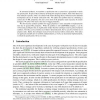Free Online Productivity Tools
i2Speak
i2Symbol
i2OCR
iTex2Img
iWeb2Print
iWeb2Shot
i2Type
iPdf2Split
iPdf2Merge
i2Bopomofo
i2Arabic
i2Style
i2Image
i2PDF
iLatex2Rtf
Sci2ools
115
click to vote
LPAR
2010
Springer
2010
Springer
Synthesis of Trigger Properties
In automated synthesis, we transform a specification into a system that is guaranteed to satisfy the specification. In spite of the rich theory developed for temporal synthesis, little of this theory has been reduced to practice. This is in contrast with model-checking theory, which has led to industrial development and use of formal verification tools. We address this problem here by considering a certain class of PSL properties; this class covers most of the properties used in practice by system designers. We refer to this class as the class of trigger properties. We show that the synthesis problem for trigger properties is more amenable to implementation than that of general PSL properties. While the problem is still 2EXPTIME-complete, it can be solved using techniques that are significantly simpler than the techniques used in general temporal synthesis. Not only can we avoid the use of Safra's determinization, but we can also avoid the use of progress ranks. Rather, the techn...
Related Content
| Added | 14 Feb 2011 |
| Updated | 14 Feb 2011 |
| Type | Journal |
| Year | 2010 |
| Where | LPAR |
| Authors | Orna Kupferman, Moshe Y. Vardi |
Comments (0)

